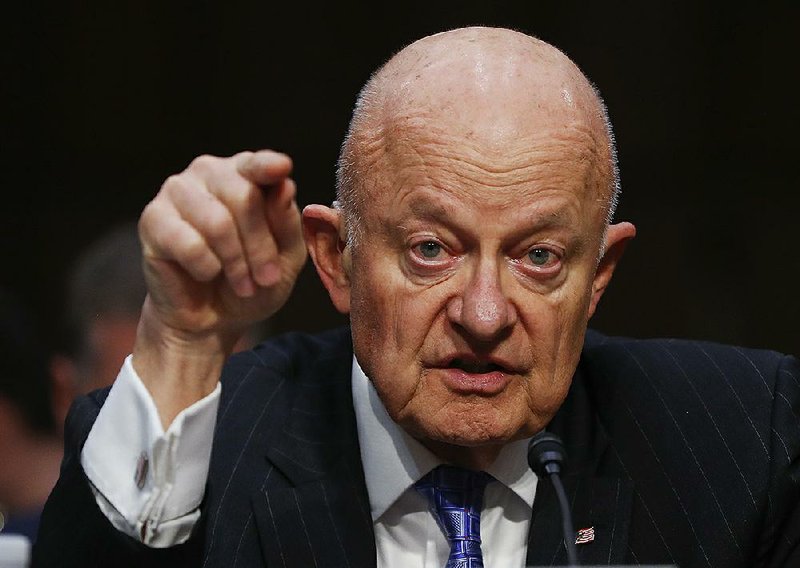WASHINGTON -- American democracy is "under assault" on separate fronts from President Donald Trump and Russia, the former U.S. intelligence chief warned Sunday, expressing dismay over the abrupt firing of FBI Director James Comey amid a probe into Moscow's meddling in U.S. elections and possible ties with the Trump campaign.
As Trump works to fast-track Comey's successor, lawmakers from both parties urged him to steer clear of any politicians for the job and say he must, in the words of Sen. Lindsey Graham, "clean up the mess that he mostly created."
"I think, in many ways, our institutions are under assault, both externally -- and that's the big news here, is the Russian interference in our election system," said James Clapper, the former director of national intelligence. "I think as well our institutions are under assault internally."
When he was asked, "Internally, from the president?" Clapper said, "Exactly."
[PRESIDENT TRUMP: Timeline, appointments, executive orders + guide to actions in first 100 days]
Clapper spoke after Trump's sudden firing of Comey last week, which drew sharp criticism because it came amid the FBI's investigation into Russia's interference in the 2016 presidential election. Clapper said America's Founding Fathers had created three co-equal branches of government with checks and balances, but with Trump as president, that was now "eroding."
After a week of turmoil, none of Trump's top aides appeared on the major Sunday morning news shows to defend and explain the president's decision. Host Chris Wallace opened Fox News Sunday by highlighting who was not on his guest list, saying that the White House would not make anyone available to discuss the Comey firing.
Trump slipped away to his private golf course in Virginia, where aides said he planned to make calls, have lunch and perhaps hit a few golf balls.
Nikki Haley, the U.S. ambassador to the United Nations, was the only member of the administration to appear on Sunday's shows, saying on ABC's This Week, "The president is the CEO of the country. He can hire and fire whoever he wants."
Comey was fired two days before he was to testify before the Senate Intelligence Committee. He later canceled his appearance.
"We would love to have Director Comey appear in an open hearing," Sen. Mark Warner, D-Va., said on This Week. "Jim Comey deserves his chance to lay out to the American public his side of the facts."
In a separate appearance on Fox News Sunday, Warner said, "my expectation is that we will get a chance to hear from him in public."
Warner said it was "virtually unprecedented" to have a president fire an FBI director -- it has happened just once before -- and the fact it occurred as Comey led an investigation into the Trump campaign was particularly concerning.
"To fire him mid-investigation, boy oh boy, that raises a lot of questions," Warner said.
Lawmakers from both parties reprimanded Trump's actions, which included shifting explanations from the White House for Comey's dismissal and an ominous tweet by Trump that warned Comey against leaks to the press because he may have "tapes" of their conversations. The lawmakers called for a new FBI director without any political background and said Trump would need to hand over to Congress any taped conversations with Comey, if they exist.
Calling Trump's remarks about possible taped conversations "outrageous," Warner said his panel or another committee would "absolutely" subpoena the tapes.
"We have got to make sure that these tapes, if they exist, don't mysteriously disappear," Warner said.
Asked whether Trump had fired Comey in order to obstruct ongoing investigations, Warner said, "What was going on the president's mind, I don't know. I do know we're going to get to the bottom of this, regardless."
Republican Sen. Ben Sasse of Nebraska, a critic of Trump in the past, said Comey's firing "exacerbates the erosion of trust" in public institutions.
"We are in the midst of a civilization-warping crisis of public trust," Sasse said on CBS' Face the Nation on Sunday.
Graham, a Republican member of the Judiciary Committee, said selecting an FBI agent to lead the agency would allow the nation to "reset." He dismissed as less desirable at least two of the 14 candidates under consideration by Trump, former Rep. Mike Rogers of Michigan and Sen. John Cornyn of Texas, explaining that "these are not normal circumstances."
Rogers, an ex-FBI agent and former chairman of the House Intelligence Committee, has drawn the backing of the FBI Agents Association. Cornyn is the No. 2 Republican in the Senate.
"It's now time to pick somebody who comes from within the ranks, or has such a reputation that has no political background at all that can go into the job on Day 1," said Graham, R-S.C.
"The president has a chance to clean up the mess he mostly created," he said, adding, "I have no evidence that the president colluded with the Russians at all ... but we don't know all the evidence yet."
Sen. Mike Lee, a Republican from Utah, continued to argue that the president should consider Merrick Garland -- the federal judge nominated to the Supreme Court last year by President Barack Obama. Lee said he was "absolutely serious about it."
A former top aide to Sen.Mitch McConnell of Kentucky, Josh Holmes, said McConnell is interested in the suggestion. "I think the Senate majority leader thinks that's a fantastic idea," Holmes said. Garland never got a hearing because of Republican obstruction, and the high court vacancy was filled last month by Neil Gorsuch.
Senate Minority Leader Charles Schumer of New York said the new FBI director should be someone "not of partisan background" with "great experience" and "courage." Declining comment on a Garland nomination, Schumer left open the possibility that Democrats might withdraw support for a new FBI director unless the Justice Department names a special prosecutor. Under Senate rules, Republicans could still confirm an FBI director with 51 votes. Republicans hold 52 seats in the chamber to Democrats' 48.
Warner and other Democrats also questioned the involvement of Attorney General Jeff Sessions in interviewing candidates to replace Comey. Sessions recused himself from involvement in the Russian election probe after failing to disclose 2016 contacts with Russia's ambassador to the U.S.
"He didn't tell the truth about meeting with the Russians, so he recused himself," Schumer said of Sessions on CNN's State of the Union. "Now he seems to be violating that recusal."
Sessions and Deputy Attorney General Rod Rosenstein spent Saturday at the Justice Department interviewing a series of candidates to replace Comey as FBI chief. Comey, according to The New York Times, attended the matinee of the touring Broadway musical Fun Home a block away in downtown Washington.
Democrats continued Sunday to call for appointment of a special prosecutor to handle the FBI investigation into whether Trump's campaign knew of Russian interference in the 2016 election. And after a parade of eight candidates appeared at the Justice Department for interviews, members of Congress began voicing their preferences for Comey's replacement.
But Schumer told CNN that many Democratic senators support blocking Trump's nominee for FBI director until the Justice Department names a special prosecutor.
"We will have to discuss it as a caucus, but I would support that move, because who the FBI director is is related to who the special prosecutor is," Schumer said, noting that Warner, whose committee is also conducting a Russia probe, also supports a special prosecutor.
Most Republicans, including House Speaker Paul Ryan, R-Wis., and other House and Senate leaders, oppose a special prosecutor. But Rep. Lloyd Smucker, R-Pa., a first-term lawmaker, told a Rotary Club luncheon in his district last week that Trump's reasons for firing Comey raise "serious and legitimate questions about timing, intent and the integrity of ongoing investigations."
The Senate expects to get more details about Comey's firing this week in a requested briefing from Rosenstein, whose memo to Sessions said that "the FBI's reputation and credibility have suffered substantial damage" under Comey's leadership. White House aides continue to cite the memo as a driving factor in the president's decision. The White House initially cited the memo as justification for the firing. The timing of Rosenstein's Senate briefing is uncertain.
Less than a week after Trump fired Comey, the administration has interviewed at least eight candidates to be FBI director, and Trump has said a decision could come before he leaves Friday on his first overseas trip as president.
Trump abruptly fired Comey on Tuesday and later said Comey was a "showboat" and "grandstander" who was not doing a good job. Trump said in an interview with NBC that the Russia investigation factored into his decision to fire Comey.
Trump said in his dismissal letter to Comey that the director had informed him on three separate occasions that he was not under investigation -- once at a private dinner and twice in phone conversations, he said in an NBC interview. Comey associates have cast doubt on that account.
The FBI director serves a 10-year term but can be replaced by the president.
So far 14 people have emerged as candidates. Eight met at the Justice Department on Saturday with Sessions and Rosenstein:
• Alice Fisher, a high-ranking Justice Department official in the George W. Bush administration.
• Adam Lee, special agent in charge of the FBI's office in Richmond, Va.
• Andrew McCabe, the acting FBI director.
• Michael J. Garcia, a former prosecutor and associate judge on New York's highest court.
• Cornyn, a former Texas attorney general.
• U.S. District Judge Henry E. Hudson, a Bush appointee who struck down the centerpiece of the Obama administration's health care law in 2010.
• Frances Townsend, a former Bush homeland security and counterterrorism adviser.
• Rogers. The FBI Agents Association says it believes his diverse background makes him the best choice.
Meanwhile, New York has opened an investigation into the real-estate dealings of Trump's former campaign manager, Paul Manafort.
The probe by New York Attorney General Eric Schneiderman is in a preliminary stage, according to a person familiar with the matter who asked not to be named because the investigation isn't public. Manafort, who ran Trump's campaign from April to August last year, has owned property in the Hamptons and Trump Tower in Manhattan.
Manhattan District Attorney Cyrus Vance Jr. is also in the early stages of an investigation into Manafort's transactions, a person familiar with that probe said. Representatives for Schneiderman and Vance declined to comment.
The inquiries by the two Democrats could pose added legal peril for Manafort if investigators find evidence of a crime. Unlike a probe by the U.S. Justice Department and FBI, the president and Attorney General Jeff Sessions have no authority over New York state investigators scrutinizing whether Manafort broke state laws. Schneiderman is responsible for enforcing New York's securities laws under the Martin Act, which gives him broad powers to pursue white-collar crime.
"If someone's leaking information about an investigation, that's a crime," Manafort spokesman Jason Maloni said in a phone call on Saturday.
The Wall Street Journal on Friday reported on the state investigations. The newspaper also said the Justice Department had requested Manafort's banking records from Citizens Financial Group as part of its inquiry into whether Trump's former campaign associates colluded with Russia during the 2016 election.
Information for this article was contributed by Hope Yen, Catherine Lucey, Sadie Gurman and Darlene Superville of The Associated Press; by Laura King of Tribune News Service; by Christopher Condon, Ben Brody, Margaret Talev, Erik Larson and Greg Farrell of Bloomberg News; and by Ed O'Keefe and Jenna Johnson of The Washington Post.
A Section on 05/15/2017

